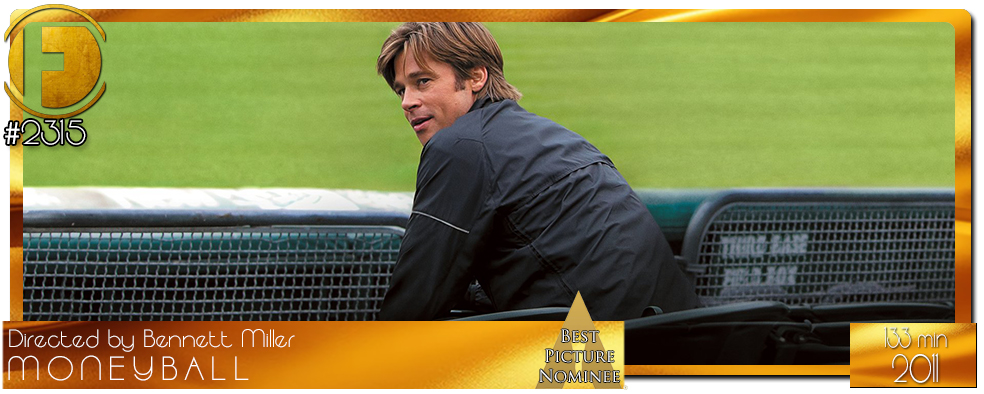Movie Review – Moneyball
Principal Cast : Brad Pitt, Jonah Hill, Philip Seymour Hoffman, Robin Wright, Chris Pratt, Stephen Bishop, Reed Diamond, Brent Jennings, Ken Medlock, Jack McGee, Vyto Ruginis, Nick Searcy, Glenn Morshower, Casey Bond, Nick Porrazzo, Kerris Dorsey, Arliss Howard, Derrin Ebert.
Synopsis: Oakland A’s general manager Billy Beane’s successful attempt to assemble a baseball team on a lean budget by employing computer-generated analysis to acquire new players.
********
Although I admit to not being a fan of America’s pastime, baseball, nor even that knowledgeable about it, I do recognise its long and storied legacy as a “sports movie” staple, not the least of which has seen notable classics such as Field of Dreams, A League of Their Own, and even 80’s comedy staple Major League. Moneyball, based on a book about the real-life Oaklands Athletic baseball team’s record-setting 2002 season by Michael Lewis, is another in a long line of baseball films, and easily equal to some of those mentioned above in terms of stature. This is a fascinating insight into the modern baseball industry, and how it was turned on its head by manager Billy Beane and young economics graduate Peter Brand (who, it turns out is loosely based on real-life football and baseball executive Paul DePodesta) as they used a scientific formula to craft a winning team of mid-to-low talent players instead of paying out million-dollar contracts for their baseball team. Again, I admit to having little understanding of (or even interest in) baseball as a game, but I can recognise a great story and Moneyball is a really great story.

The Oakland Athletic Baseball team are moderately successful in the minor leagues. However, several of their star players are recruited to the big leagues by high-paying clubs, something Oakland can’t prevent. After banging his head against a wall trying to recruit lesser players from other willing teams, Oakland manager Billy Beane (Brad Pitt) recruits Harvard Economics Major Peter Brand (Jonah Hill) to assemble a team based upon a computer programme that chooses players who might not be superstars, or have any number of issues, but can still play, and generate a winning squad. After a series of fumbles, and deep resentment from the team’s band of talent scouts, Oakland starts to win games of baseball, draw in larger crowds, and shatter expectation of the game’s previous winning streak record held for nearly six decades.

Everyone loves an underdog story. They’ve been a staple of Hollywood – and in particular sports films – since the ability to tell stories first sprang up in the ancient world. From the “battling old age” to the “team of misfits” to the “disillusioned coach” tropes, there are very few American success stories that haven’t been tackled on screen in one form or another. You’d think sporting films would have worn out their welcome like the tsunami of annual Hallmark product over the journey, but people keep returning to these often heartwarming or transcendent celebrations of the human spirit time and again, making writers and directors scrounge for every morsel of replication throughout America’s sporting landscapes. Traditionally, Hollywood loves a story from one of the Big Three – American Football, baseball or basketball – to sell its wares, and although Basketball and the NFL are typically more action oriented by the very nature of the sport, baseball often offers a more prosaic, intellectual dissection of American culture through being “America’s Pastime”.

Similar in tone to Clint Eastwood’s Trouble With The Curve, Moneyball pries open the cutthroat world of baseball player trading between the minor and major league organisations, multimillion dollar corporations spending big in their quest to win their various division and national titles, including the venerated World Series. Brad Pitt’s Oakland Athletics team manager, Billy Beane, himself a former player who struck out despite plenty of talent, is frustrated by an industry throwing mega-paychecks to players in order to buy success, and so when the opportunity arises to circumvent the game’s traditional methodology of curating and massaging talent and do it “on the cheap”, so to speak, he grabs it and runs with it. The film’s screenplay was written by Stephen Zaillian and Aaron Sorkin, men whose names come with a genuine gravitas, and as you might expect there’s a lot of expositional babble to navigate here; as I mentioned, I’m not super-knowledgeable on the inner workings of baseball or the industry around it, and yet I never really felt too lost, thanks to whip-smart dialogue that doesn’t stop to baby you into understanding it.

The film’s central dynamic, between Bean and Jonah Hill’s quieter, analytical Peter Brand, is the anchor of the plot, and both actors are terrific. Pitt holds the film’s heart together with ease, making Beane seem both approachable and irascible at the same time, a conflict between heart and mind reflected in the brutal inner workings of trading various players throughout the season. That a person’s livelihood in the game can be ended on the whim of a manager, despite what feels like contract breaches all over the place, is alarming to say the least, but adds to the simmering angst bubbling just beneath the surface. Pitt, Hill, a young pre-superfame Chris Pratt, Philip Seymour Hoffman (as the team’s on-field head coach) and a blink-and-miss-it cameo from Robin Wright, are all decent and nuanced turns, although whether each character’s arc works to coalesce into the whole I remain unconvinced. Hoffman’s arc in particular I just couldn’t wrap my head around – here’s a guy in charge of the team on gameday, and he isn’t brought on board the moneyball scheme by either Beane or Brand? I didn’t buy it. Pratt’s has-been player role also wasn’t resolved to my satisfaction, a by-product of perhaps too many tangents within the overall narrative Sorkin and Zaillian couldn’t tie up by the end.

Whether it all entirely works perhaps isn’t the point, I think. Moneyball focuses less on the game and more on the people, something I really attached to as a viewer with little interest in the mechanics of the playing of a game, and as a result I really found myself enjoying the movie. Director Bennett Miller crafts a quieter, introspective look at one of modern baseballs great success stories of the 21st Century, and delivers it without ostentation or superlative. There’s a workmanlike essence to his direction here – emblematic of his style on both Capote and later of Foxcatcher – and as mentioned earlier feels very similar to recent Clint Eastwood-esque tonality in its realistic sombreness. Films based on true stories, and in particular sports films, tend to lead heavily into parochialism and sentimentalism (if not outright forgery), but aside from a couple of combination characters to shortcut some dramatic urgency there’s very little I can glean from my research to indicate this film is anything other than respectful, both good and bad, to the events as they occurred. Without much pomp or ceremony, Moneyball is an excellent dramatic venture and a terrific leading turn from Pitt, and definitely worth your time regardless of your interest in baseball.

